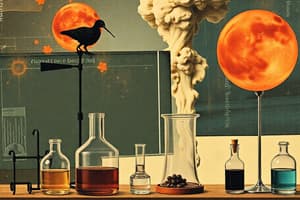Podcast
Questions and Answers
Flashcards
Kinetic Energy
Kinetic Energy
Energy of motion. Objects in motion possess kinetic energy.
First Law of Thermodynamics
First Law of Thermodynamics
Energy cannot be created or destroyed, only transformed from one form to another.
State Function
State Function
A property that depends only on the current state of a system, not on the path taken to reach that state.
Enthalpy Change (ΔH)
Enthalpy Change (ΔH)
Signup and view all the flashcards
Heat Capacity
Heat Capacity
Signup and view all the flashcards
Potential Energy
Potential Energy
Signup and view all the flashcards
Specific Heat Capacity
Specific Heat Capacity
Signup and view all the flashcards
Hess's Law
Hess's Law
Signup and view all the flashcards
Boyle's Law
Boyle's Law
Signup and view all the flashcards
Dalton's Law of Partial Pressures
Dalton's Law of Partial Pressures
Signup and view all the flashcards
Kinetic Molecular Theory (gases)
Kinetic Molecular Theory (gases)
Signup and view all the flashcards
Effusion
Effusion
Signup and view all the flashcards
Ideal Gas vs. Real Gas
Ideal Gas vs. Real Gas
Signup and view all the flashcards
Kinetic Energy Example
Kinetic Energy Example
Signup and view all the flashcards
1st Law Thermodynamics
1st Law Thermodynamics
Signup and view all the flashcards
State Function Example
State Function Example
Signup and view all the flashcards
Enthalpy Change (ΔH)
Enthalpy Change (ΔH)
Signup and view all the flashcards
Heat Capacity
Heat Capacity
Signup and view all the flashcards
Potential vs Kinetic energy
Potential vs Kinetic energy
Signup and view all the flashcards
Specific Heat Capacity
Specific Heat Capacity
Signup and view all the flashcards
Hess's Law
Hess's Law
Signup and view all the flashcards
Boyle's Law
Boyle's Law
Signup and view all the flashcards
Dalton's Law Partial Pressures
Dalton's Law Partial Pressures
Signup and view all the flashcards
Kinetic Molecular Theory (gases)
Kinetic Molecular Theory (gases)
Signup and view all the flashcards
Effusion
Effusion
Signup and view all the flashcards
Ideal vs. Real Gases
Ideal vs. Real Gases
Signup and view all the flashcards
Kinetic Energy Example
Kinetic Energy Example
Signup and view all the flashcards
First Law of Thermodynamics
First Law of Thermodynamics
Signup and view all the flashcards
State Function
State Function
Signup and view all the flashcards
Enthalpy Change (ΔH)
Enthalpy Change (ΔH)
Signup and view all the flashcards
Heat Capacity
Heat Capacity
Signup and view all the flashcards
Potential vs Kinetic energy
Potential vs Kinetic energy
Signup and view all the flashcards
Specific Heat Capacity
Specific Heat Capacity
Signup and view all the flashcards
Hess's Law
Hess's Law
Signup and view all the flashcards
Boyle's Law
Boyle's Law
Signup and view all the flashcards
Dalton's Law Partial Pressures
Dalton's Law Partial Pressures
Signup and view all the flashcards
Kinetic Molecular Theory (gases)
Kinetic Molecular Theory (gases)
Signup and view all the flashcards
Effusion
Effusion
Signup and view all the flashcards
Ideal vs. Real Gases
Ideal vs. Real Gases
Signup and view all the flashcards
Kinetic Energy
Kinetic Energy
Signup and view all the flashcards
Study Notes
Quiz 1: Chemistry 1
- Instructions: Answer all questions, show work for calculations, and use appropriate units.
Multiple Choice Questions
- Question 1: A rolling ball is an example of kinetic energy.
- Question 2: The First Law of Thermodynamics states energy cannot be created or destroyed, only transformed.
- Question 3: Enthalpy is a state function.
- Question 4: Enthalpy change (ΔH) is defined as the heat absorbed or released at constant pressure.
- Question 5: Heat capacity is the amount of heat required to raise the temperature of a substance by 1 degree Celsius, and it is independent of the mass of the substance.
Short Answer Questions
- Question 6: Potential energy is stored energy due to position or composition (e.g., water behind a dam, a compressed spring). Kinetic energy is energy of motion (e.g., a moving car, a rolling ball).
- Question 7: Enthalpy is a state function because its value only depends on the initial and final states of the system, not the path taken.
- Question 8: Calculation for specific heat capacity of a metal.
- Heat gained by water (using q = mcΔT)
- Heat lost by metal (is equal in magnitude but opposite in sign to heat gained by water)
- Calculate specific heat capacity of a metal (using equation)
Calculations and Conceptual Questions
- Question 9: Hess's Law calculation for enthalpy change for a reaction. (involves manipulating chemical equations).
- Question 10: Caloric content of food relates to thermochemistry via energy changes during the metabolic process, which is similar to combustion reactions in terms of energy released (heat/energy from bonds).
- Question 11: Gases exert pressure on container walls due to their constant, rapid and random motion and collisions.
- Question 12: Boyle's Law states that for a given mass of gas at constant temperature, volume and pressure are inversely related (PV=constant).
- Question 13: Calculation of volume of a gas when pressure and temperature are changing based on Combined Gas Law.
- Question 14: Calculation of moles of a gas using Ideal Gas Law.
- Question 15: Dalton's Law of Partial Pressures: Total pressure in a mixture of non-reacting gases equals the sum of the partial pressures of each individual gas.
Additional Questions
- Question 16: Kinetic-Molecular Theory describes gas particles as small, hard spheres in constant, random motion, and collisions are perfectly elastic.
- Question 17: Graham's Law of Effusion: The rate of effusion of a gas is inversely proportional to the square root of its molar mass. Compare the effusion rates of helium and oxygen.
- Question 18: Ideal gases vs. Real Gases: Ideal gases assume no intermolecular forces and negligible volume of gas particles. Real gases have intermolecular forces and a finite volume
Studying That Suits You
Use AI to generate personalized quizzes and flashcards to suit your learning preferences.



